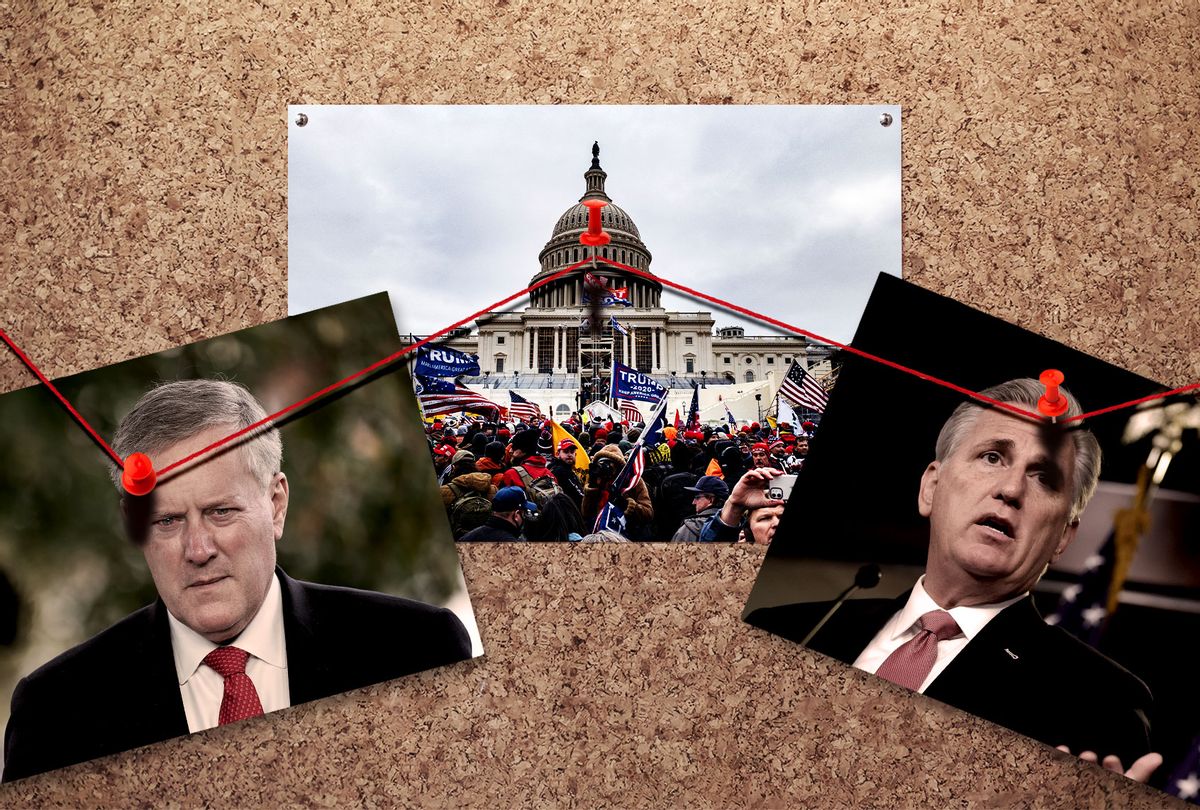As the House select committee investigating the Jan. 6 Capitol riot continues its work, reports suggest it is closely scrutinizing a PowerPoint document filled with conspiracy theories and several plans to overturn the 2020 election results.
The 38-page file turned over by former White House Chief of Staff Mark Meadows was titled "Election Fraud, Foreign Interference & Options for 6 JAN" and was circulating "on the hill" in the days prior to Jan. 6, according to a letter Rep. Bennie Thompson, the select committee's chairman, sent to Meadows' attorney earlier this week.
The document is part of the reason the committee is so interested in speaking with Meadows more extensively, Thompson said, which leaves him "no choice" but to bring Meadows up on contempt of Congress charges after he stopped cooperating with the committee.
Want a daily wrap-up of all the news and commentary Salon has to offer? Subscribe to our morning newsletter, Crash Course.
Both the Guardian and The New York Times report that a different, 36-page version of the PowerPoint circulating online is similar to the one received by the committee. Both include plans to declare a national emergency in order to delay the certification of the 2020 election and the outlines of a wild conspiracy that the country of Venezuela had taken over voting machines in a large number of important states, among other debunked and unverifiable allegations.
Though it remains unknown who first created the document, the Times notes it bears striking similarities to the theories of Jovan Hutton Pulitzer, which the paper describes as a "Texas entrepreneur and self-described inventor."
Meadows' attorney, George J. Terwilliger III, told the committee that the ex-Trump aide turned over the PowerPoint to the committee after receiving it via email and that he had not done anything with it.
"We produced the document because it wasn't privileged," Terwilliger wrote.
But the Times reports that Phil Waldron, a retired Army colonel and one of the key propagators of Trump's Big Lie, apparently circulated the document among influential lawmakers, holding several briefings for Senators and House members on Jan. 4 and 5, respectively. Waldron, who reportedly cites a history of involvement with "informational warfare," told the paper that he hadn't given Meadows a copy but wasn't surprised it found his way to Trump's chief of staff.
"He would have gotten a copy for situational awareness for what was being briefed on the Hill at the time," he said.
It's unclear Meadows' continuing involvement with Waldron around Jan. 6 — though Waldron told The Washington Post that he met with Meadows and others at the White House just a few weeks earlier, around Christmas, to discuss investigative avenues, and held another meeting with Trump and several Pennsylvania legislators in the Oval Office on Nov. 25.
Former New York City Mayor and personal attorney to Trump Rudy Giuliani has also talked openly about receiving information from Waldron for his legal campaign to overturn the 2020 election, the Post reported, often serving as a go-between for Meadows and the retired Army colonel.
Shortly after turning over the document — and thousands of other emails and texts — Meadows decided to stop cooperating with the Jan. 6 committee. The drawback sets up an escalating legal battle that entered a new phase this week, with Meadows suing House Speaker Nancy Pelosi and the Jan. 6 committee in the hopes a judge will block the subpoenas.
The United States Court of Appeals for the District of Columbia Circuit also recently poked a hole in Trump's argument that he be allowed to keep documents from the Jan. 6 committee, writing that Congress has a broad mandate to Congress investigate any attacks launched against it.
"The January 6th Committee has also demonstrated a sound factual predicate for requesting these presidential documents specifically," the court writes. "There is a direct linkage between the former President and the events of the day."
More news from the Jan. 6 committee:



Shares